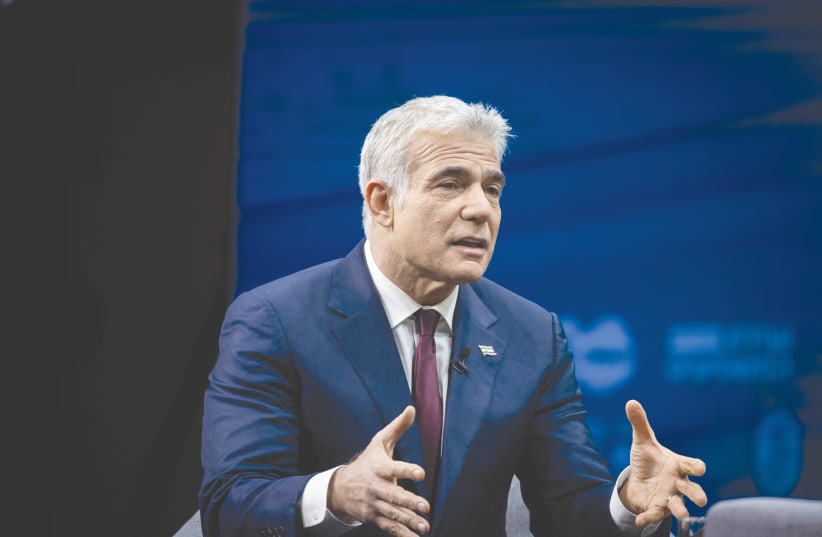Prime Minister Benjamin Netanyahu’s proposed coalition of ultra-Orthodox parties and the far-Right Kahanists would erode democratic institutions, reinforce social fragmentation, alienate large parts of the Diaspora and energize the anti-Zionist delegitimization campaign. It would be an Israel that growing numbers of young Israelis, the backbone of Start-Up Nation, would increasingly flee in despair.
I am voting for Yair Lapid because he represents the most coherent vision for ensuring that Israel retains its place in the modern and democratic world – essential for our ability to survive in the Middle East and to thrive in the international community.
The year of Corona has given us a terrifying glimpse into failed-state Israel. The government’s impressive success in vaccinating the public cannot obscure its otherwise abysmal record. A chaotic and almost laughably incompetent administration lost the trust of the public and failed to impose its authority, strengthening a defiant ultra-Orthodox state-within-a-state.
This last year has exposed the increasingly untenable nature of the relationship between the haredi or ultra-Orthodox community and the state. That relationship begins with haredi secession, exemption from basic responsibilities of Israeli citizenship. Coalition machinations then compel the mainstream to subsidize haredi separatism. Finally, through increasing domination of the state religious apparatus, the haredi community enforces its norms on the mainstream.
That pattern has played out, with terrible consequences, over the last months. Large parts of the haredi community effectively seceded from the mainstream effort to contain Corona, resulting in wildly disproportionate haredi infection and death rates. Meanwhile, haredi politicians prevented the government from imposing a selective lockdown on the most infected areas, because that would have singled out haredi communities. As a result, large parts of the country that didn’t need to be locked down were shut anyway, resulting in economic devastation.
Corona is Israel’s wake-up call. The haredi state-within-a-state threatens our long-term viability.
Yair Lapid was the first among this generation of Israeli politicians to warn against the dangers of this relationship. Yet unlike Avigdor Liberman, who speaks of the haredim with contempt and periodically requires a new internal enemy to energize his political campaigns, Lapid sees haredim as partners in the Israeli future. He has reached out to the haredi community, seeking dialogue, even as he insists that its relationship with the state must change. His approach is respectful but firm: He will neither incite nor back down.
Though Netanyahu has attempted to portray him as a “leftist,” in fact Yair Lapid is the first Israeli leader to articulate a coherent centrist politics.
The centrist vision begins with Israel’s Declaration of Independence. The framers insisted on an Israel at once Jewish and democratic: the state of all Jews, whether or not they are its citizens; the state of all of its citizens, whether or not they are Jews. Through Israel’s formative years, this definition was self-evident to both right-wing and left-wing Israelis. David Ben-Gurion’s Labor Party was committed to Israel as a Jewish state, and Menachem Begin’s Likud was committed to Israel as a democratic state.
In recent years, though, this foundational entwinement of Jewish and democratic identities has been under increasing assault. Lapid has defined defending the integrity of Jewish and democratic Israel as the core of the centrist mission.
THAT MISSION means ensuring that all parts of Israeli society, including the Arab minority, are treated as shareholders in the country’s future. It also means ensuring that all parts of the Diaspora remain connected to Israel. A Jewish state is not the same as a Jewish community; it doesn’t belong to any one part of the Jewish people. The Israeli public space must reflect the totality of the Jewish experience; official Judaism cannot be entrusted to a single gatekeeper. To do so negates the Zionist commitment to Jewish peoplehood.
The Israeli Center is the ground that holds together the paradoxes of Israeliness. We are at once Jewish and democratic, secular and religious, East and West, the strongest power in the Middle East and the only country in the world living under the threat of a permanent death sentence imposed by many of our neighbors. Our complex identities and challenges defy simplistic solutions. Only the Center, I believe, can effectively navigate those complexities.
I’ve spent much of my life as an Israeli voter being frustrated by one failed centrist party after another. Yesh Atid is the first centrist party that has proven its staying power – its ideological consistency and its ability to build a camp of devoted voters.
Finally, I’m voting for Yair Lapid because he’s proven himself to be that rarest of Israeli politicians: a mensch. Compare his tone to other candidates: He focuses on the issues, avoids cheap shots, insists on treating us like grown-ups.
And he has proven his willingness to sacrifice ego for the greater good, deferring to the three former IDF commanders in chief who took over Blue and White. Yet Lapid proved himself to be the only effective political leader among them, the only one still standing.
Over the years, we’ve watched Yair Lapid commit mistakes and learn from those mistakes. He has grown – in steadiness and determination. He has earned our respect and our confidence in his leadership.
The writer is author of the New York Times bestseller, Letters to My Palestinian Neighbor and of Like Dreamers, which won the Jewish Book Council’s Everett Book of the Year award.
